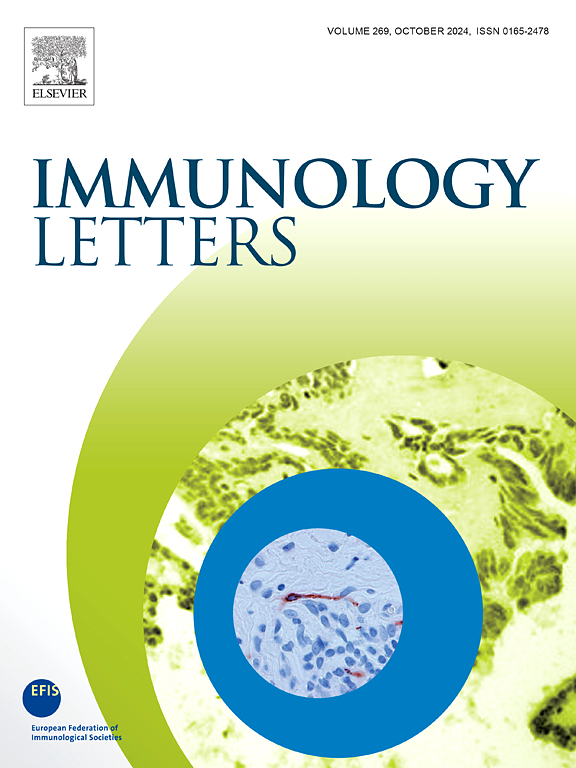母体免疫球蛋白在人类初乳和母乳喂养新生儿的粪便中结合不同的细菌群落。
IF 2.8
4区 医学
Q3 IMMUNOLOGY
引用次数: 0
摘要
在早期,母体免疫球蛋白通过影响宿主和微生物组之间的相互作用,对维持肠道环境的平衡至关重要。先锋菌株的连续建立是一个有趣的研究课题,其中母体免疫球蛋白似乎很重要。这项概念验证研究探讨了IgA1、IgA2、IgM和IgG类与人类初乳和母乳喂养新生儿粪便中的共生细菌的结合模式。我们使用流式细胞术结合16S rRNA基因测序对人类初乳和新生儿粪便样本进行分析,以表征igg与微生物群的关联。我们观察到,在人类初乳样品中,IgA2和IgM结合α和β变形菌,这可能会刺激肠道中新生儿免疫系统的发育。其他免疫球蛋白如IgG主要结合属于厚壁菌门的兼性厌氧菌,据报道,厚壁菌门是母乳微生物群的一部分,也是新生儿肠道的先驱者。母体免疫球蛋白还能结合新生儿粪便中的多种细菌。例如,与IgG相比,IgA2和IgM结合了更多的拟杆菌门成员,这些拟杆菌门和一些厚壁菌门被报道为新生儿肠道的晚期定植者,它们的存在是重要的,因为它们能够产生重要的短链脂肪酸,如丙酸和丁酸盐。我们的研究结果支持目前的观点,即微生物和免疫球蛋白转移对新生儿免疫系统和个体肠道微生物群的发展至关重要。本文章由计算机程序翻译,如有差异,请以英文原文为准。
Maternal immunoglobulins differentially bind a diverse bacterial community in human colostrum and the stool of breastfed neonates
In the early days, maternal immunoglobulins are essential for sustaining a balanced gut environment by influencing the interaction between the host and the microbiome. The successional establishment of the pioneer strains is an interesting topic of research where maternal immunoglobulins appear to be important. This proof-of-concept study explored the binding pattern of IgA1, IgA2, IgM, and IgG classes to a commensal bacterial in human colostrum and the stool of breastfed neonates. We used flow cytometry coupled with 16S rRNA gene sequencing in human colostrum and neonatal feces samples to characterize this Ig-microbiota association. We observed that in human colostrum samples, IgA2 and IgM bind alfa and beta Proteobacteria, which can potentially stimulate neonatal immune system development in the gut. Other immunoglobulins like IgG predominantly bind facultative anaerobes belonging to the Firmicutes phylum, reported as part of human milk microbiota and pioneer colonizers of the neonatal gut. Maternal immunoglobulins also bind a wide diversity of bacteria in the neonatal stool. For instance, IgA2 and IgM bound more members of the phylum Bacteroidetes in comparison to IgG, these Bacteroidetes and some firmicutes have been reported as late colonizers of the neonatal gut, and their presence is important due to their ability to produce important short chain fatty acids like propionate and butyrate. Our results support the current view that microbial and immunoglobulin transference is crucial for developing the neonate's immune system and individual gut microbiota.
求助全文
通过发布文献求助,成功后即可免费获取论文全文。
去求助
来源期刊

Immunology letters
医学-免疫学
CiteScore
7.60
自引率
0.00%
发文量
86
审稿时长
44 days
期刊介绍:
Immunology Letters provides a vehicle for the speedy publication of experimental papers, (mini)Reviews and Letters to the Editor addressing all aspects of molecular and cellular immunology. The essential criteria for publication will be clarity, experimental soundness and novelty. Results contradictory to current accepted thinking or ideas divergent from actual dogmas will be considered for publication provided that they are based on solid experimental findings.
Preference will be given to papers of immediate importance to other investigators, either by their experimental data, new ideas or new methodology. Scientific correspondence to the Editor-in-Chief related to the published papers may also be accepted provided that they are short and scientifically relevant to the papers mentioned, in order to provide a continuing forum for discussion.
 求助内容:
求助内容: 应助结果提醒方式:
应助结果提醒方式:


